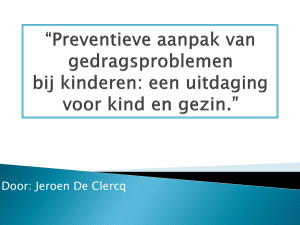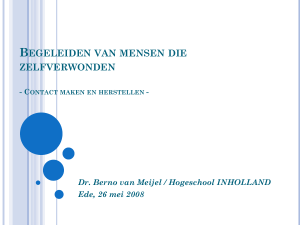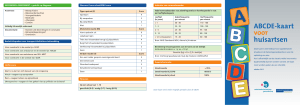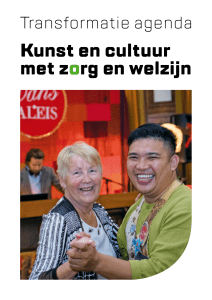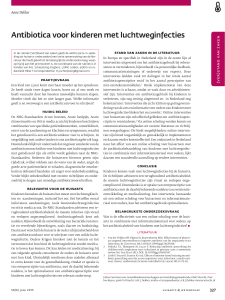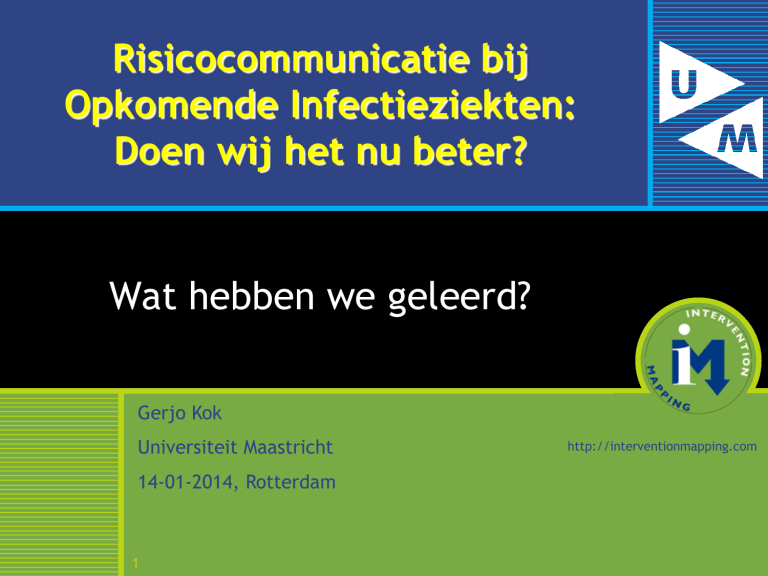
Risicocommunicatie bij
Opkomende Infectieziekten:
Doen wij het nu beter?
Wat hebben we geleerd?
Gerjo Kok
Universiteit Maastricht
14-01-2014, Rotterdam
1
http://interventionmapping.com
Belangenverstrengeling
• Potentiële belangenverstrengeling:
voor bijeenkomst mogelijk relevante
relaties met bedrijven
• Sponsoring of onderzoeksgeld:
Unrestricted Educational Grant van
Abbott Health Care Products B. V.
2
Presentatie
• Onderzoek Marloes Bults
• Trends
• Verschillen
• Determinanten
• Dreiging
• Aanbevelingen
• Planmatige interventieontwikkeling
• Conclusies
3
Trends
• Response in lijn met probleemontwikkeling
• Sterke invloed van media door ‘Framing’
• Rol van de ‘voorlichter’
• Rol van de journalist
• “Marketing research suggests that
uncertainty and fear promote increased
viewing of the news” (Alarm)
4
Verschillen
• Response in lijn met probleemontwikkeling
• Sociaal-culturele factoren: o.a. religie,
ethniciteit
• Vertrouwen in de Overheid: juiste
informatie; kan veranderen door berichten
in de media; rol van sociale media
5
Determinanten
6
Individu
Omgevingsfactoren
7
Interpersoonlijk
Individu
Omgevingsfactoren
Organisatie
Interpersoonlijk
8
Individu
Omgevingsfactoren
9
Community
Organisatie
Interpersoonlijk
Individu
Omgevingsfactoren
10
Maatschappij
Community
Organisatie
Interpersoonlijk
Individu
Even een beetje psychologie…
Als wij zelf iets goed
doen, ligt dat aan
Als wij zelf iets fout
doen, ligt dat aan
Omgeving
11
Persoon
Even een beetje psychologie…
Als wij zelf iets goed
doen, ligt dat aan
Als wij zelf iets fout
doen, ligt dat aan
Omgeving
Als anderen iets goed
doen, ligt dat aan
Als anderen iets fout
doen, ligt dat aan
12
Persoon
Determinanten
Nadelen
Ernst
Dreiging
Attitude
Kans
Oplossing
Sociale Norm
Controle
13
Intentie/
Gedrag
Determinanten
Nadelen
Ernst
Dreiging
Attitude
Kans
Oplossing
Sociale Norm
Controle
14
Intentie/
Gedrag
Ernst
Dreiging
Kans
Preventief
Gedrag
Oplossing
Bescherming
Controle
15
Meta-Analyse: Gedragsverandering
High Efficacy
Low Efficacy
16
Aanbevelingen
• Gedragsonderzoek inbedden in Plannen
• Framing, Afstemming en Vertrouwen
• Meer Onderzoek tbv Betere Interventies
17
Interventies: Methoden
Theoretische methode
Parameter
Methode
Determinant
Parameter
Interventies: Risicoperceptie
Theoretische methode
Oplossing
X
Angst
aanjagen
Risico
Perceptie
Kan ik dat?
Interventies Controle
Theoretische methode
Barrières
identificeren
Oplossingen
bedenken
Controle
Oplossingen
oefenen
Interventies: Gewoonte
Theoretische methode
Positieve
intentie
Omgeving
veranderen
Gewoonte
Inzicht in
gewoonte
Interventies: Toepassingen
Theoretische methode
Parameter
Methode
Determinant
Parameter
Context
Doelgroep
Praktische
Toepassing
Methods to Change Awareness
and Risk Perception (Adapted
from Bartholomew et al., 2011)
Definition
Parameters
Consciousness raising (Health
Belief Model; PrecautionAdoption Process Model; TransTheoretical Model: Champion &
Skinner, 2008; Weinstein et al.,
2008; Prochaska, et al., 2008)
Providing information, feedback,
or confrontation about the
causes, consequences, and
alternatives for a problem or a
problem behavior.
Can use feedback and
confrontation; however, raising
awareness must be quickly
followed by increase in problemsolving ability and (collective)
self-efficacy.
Personalize risk (PrecautionAdoption Process Model:
Champion & Skinner, 2008)
Providing information about
personal costs or risks of action or
inaction with respect to target
behavior.
Present messages as individual
and undeniable, and compare
them with absolute and
normative standards.
Scenario-based risk information
(Precaution-Adoption Process
Model: Mevissen et al., 2009)
Providing information that may
aid the construction of an image
of the ways in which a future loss
or accident might occur.
Plausible scenario with a cause
and an outcome; imagery. Most
effective when people generate
their own scenario or when
multiple scenarios are provided.
Framing (Protection Motivation
Theory: Werrij et al., 2010)
Using gain-framed messages
emphasizing the advantages of
performing the healthy behavior;
or loss-framed messages,
emphasizing the disadvantages of
not performing the healthy
behavior.
Requires high self-efficacy
expectations. Gain frames are
more readily accepted and
prevent defensive reactions.
23
Implementatie in de Praktijk
24
Conclusies
• Veel geleerd:
• Trends
• Verschillen
• Determinanten
• Risicoperceptie is niet alles
• Aanbevelingen:
• Inzichten gebruiken: Kan nu al
• Meer inzichten verwerven: Onderzoek
25





